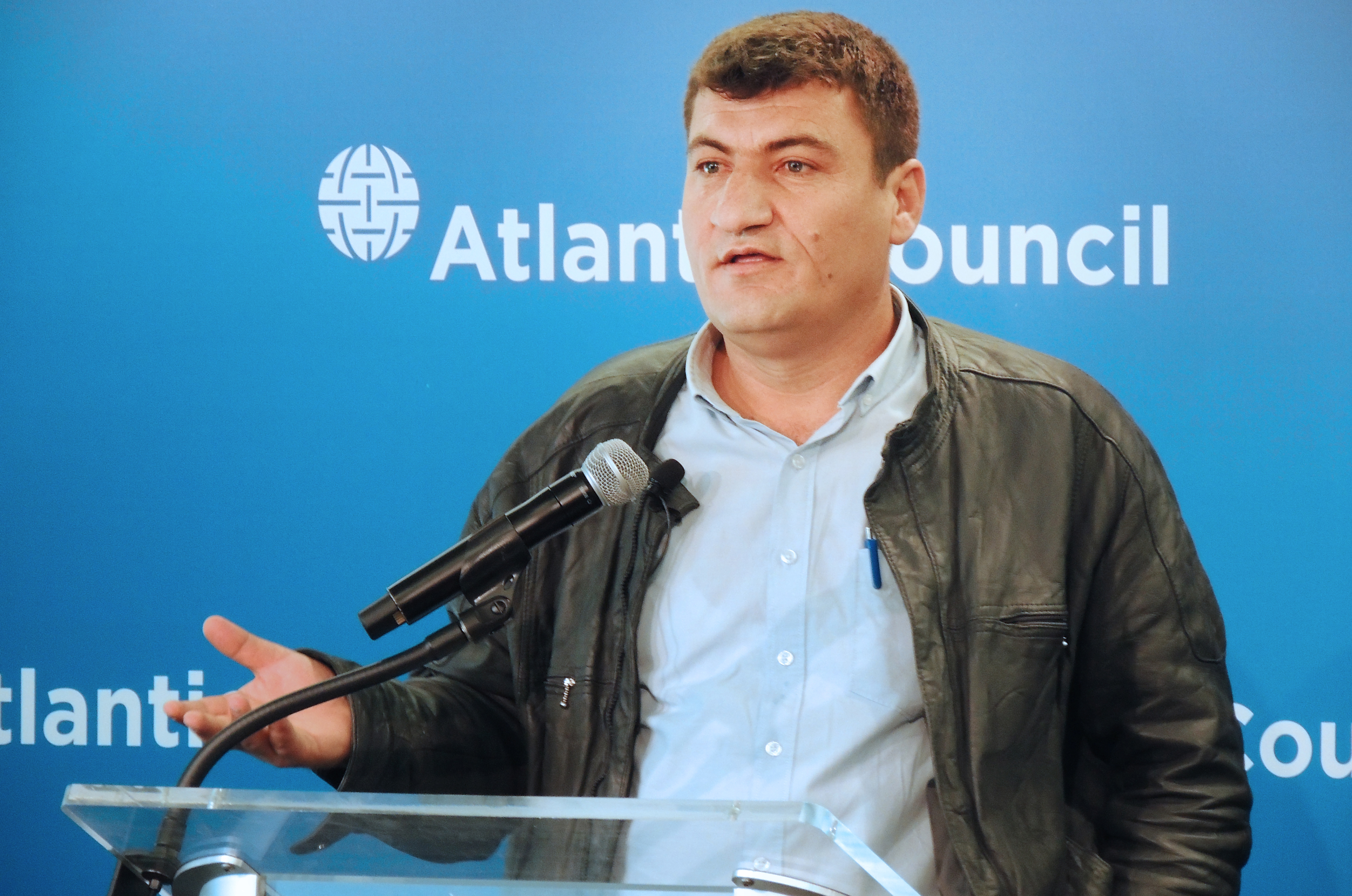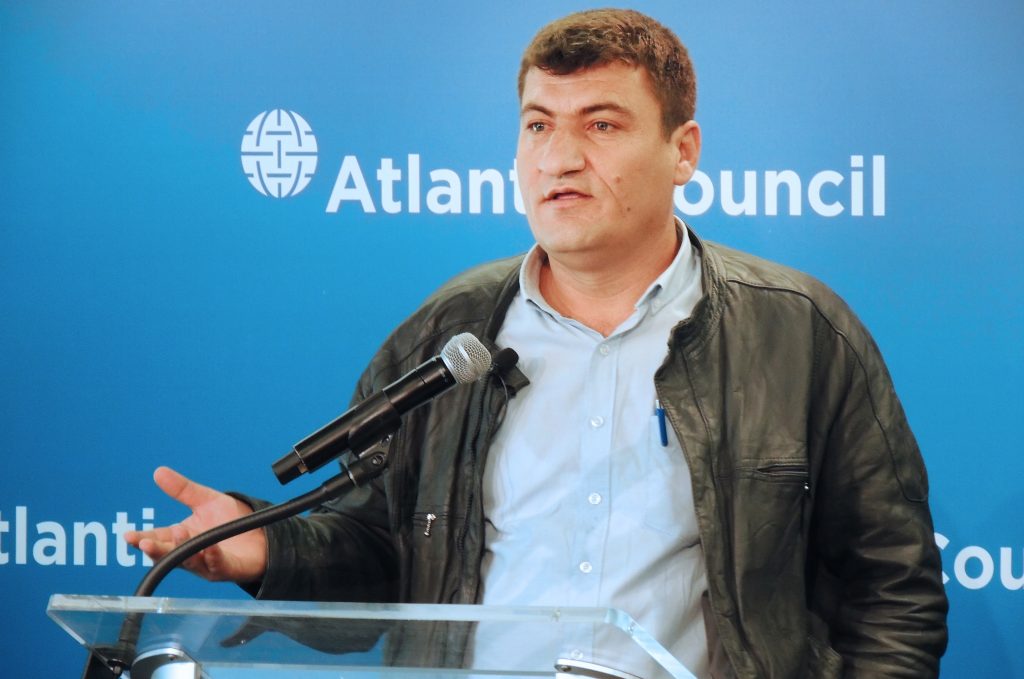 Russian warplanes have bombed not just moderate rebel groups, but also critical civilian infrastructure and people fleeing the war in Syria, a prominent Syrian civil society activist said at the Atlantic Council on Nov. 6.
Russian warplanes have bombed not just moderate rebel groups, but also critical civilian infrastructure and people fleeing the war in Syria, a prominent Syrian civil society activist said at the Atlantic Council on Nov. 6.
“Russia claims that they are fighting against [the Islamic State of Iraq and al-Sham] … but ISIS is 100 kilometers away from us, and what they are doing is they are striking us as civil society,” said Raed Fares, the Syria-based founder of the Union of Revolutionary Bureaus.
“They are hitting hospitals, they are hitting schools, they are hitting some moderate opposition groups in our area … even the al-Qaeda bases that we have in our region, even those are not being targeted [by the Russians],” he added, speaking in Arabic through a translator.
The Obama administration, doctors, and other civil society organizations have also accused Russia of bombing hospitals, including in the town of Sarmin in Idlib province on Oct. 20. Russian officials deny these accusations and have said that the facilities that they have been accused of targeting do not actually exist.
Fares said Russian jets have not even spared humanitarian camps for people fleeing the war. The intensity of the Russian airstrikes has unleashed a new wave of refugees fleeing from this onslaught, he said.
The war, now in its fifth year, has killed more than a quarter million people and created more than four million refugees.
Russia’s decision to take on a more prominent role in defending embattled Syrian President Bashar al-Assad has forced the Obama administration to rethink its own Syria policy. In October, the administration was forced to roll up a $500-million program to train and equip vetted Syrian fighters after it produced no more than a handful of US-trained recruits. Last week, the White House announced that it would deploy less than fifty US Special Operations Forces inside Syria.
Frederic C. Hof, a Resident Senior Fellow in the Atlantic Council’s Rafik Hariri Center who served in the Obama administration as a Special Adviser for transition in Syria, called the decision to deploy troops a “band-aid of sorts, although a potentially useful one.”
‘Much more ferocious’
Fares described the Russian airstrikes inside Syria as “much more ferocious” than the barrel bombs dropped by the Assad regime’s military helicopters. “The barrel bombs … take out maybe one or two homes, but a Russian airstrike in our region is causing five or six square kilometers to go up in smoke,” he said.
The Assad regime’s helicopters are also unable to fly in inclement weather or at night, but the Russian airplanes are in the sky above Syria both day and night, he added.
Fares said that on his visit to the United States he has been asking his American interlocutors if anything can be done to stop the Russian airstrikes and the Assad regime’s barrel bombs. “All we are hearing is talk. … We don’t know if there will be any solution,” he said.
Fares is in favor of a no-fly zone so that Syrians fleeing the war can have a safe place to live within their homeland.
Caught between two types of terrorism
“One of the challenges for those who seek a genuine political transition in Syria … is to ensure that the voices of those inside Syria, keeping alive the hope of self-rule, are heard and heeded,” Hof said.
Hof described Fares as representative of the “best of what Syria can be.”
Fares urged more international support for civil society organizations inside Syria, while pointing out that his group has achieved with just $2 million what the US-led coalition is achieving through its multimillion-dollar bombing campaign against ISIS.
The Assad regime and Islamist groups such as the Nusrah Front, ISIS, and al-Qaeda have tried to kill Fares, have destroyed his office, and abducted his staff. He has survived two car bombs — both times he was in the vehicle when the bombs went off but managed to escape with minor injuries — and abductions.
“We, in civil society, were caught between two different types of terrorism,” Fares said. “On the one hand the terrorism of the Assad regime and all of its backers, including Hezbollah, the Iranians, and other sponsors of the regime, and on the other hand, ISIS, al-Qaeda, and other radical groups.”
Fares compared navigating a terrain occupied by armed groups of all stripes to playing a game of soccer — bobbing and weaving while keeping control of the ball at all times.
Assad not part of solution
In a conversation moderated by Faysal Itani, a Fellow in the Hariri Center, Fares said Syrians hate Assad, ISIS, and al Qaeda. “Now they have got to the point where they hate Islamists” as well, he said. But they also hate violence and yearn for peace. “They miss normal life,” he added.
But as much as they yearn for peace, there is a red line that most Syrians will refuse to allow to be crossed. “That minimum is a political solution that has no Assad in it,” said Fares. “After all this time people cannot go back to seeing this man at the helm of the country.”
Ashish Kumar Sen is a staff writer at the Atlantic Council.
Image: “We, in civil society, were caught between two different types of terrorism,” Raed Fares, a Syrian civil society activist, said at the Atlantic Council in Washington on Nov. 6. "On the one hand the terrorism of the Assad regime and all of its backers, including Hezbollah, the Iranians, and other sponsors of the regime, and on the other hand, ISIS, al Qaeda, and other radical groups.” (Atlantic Council)
